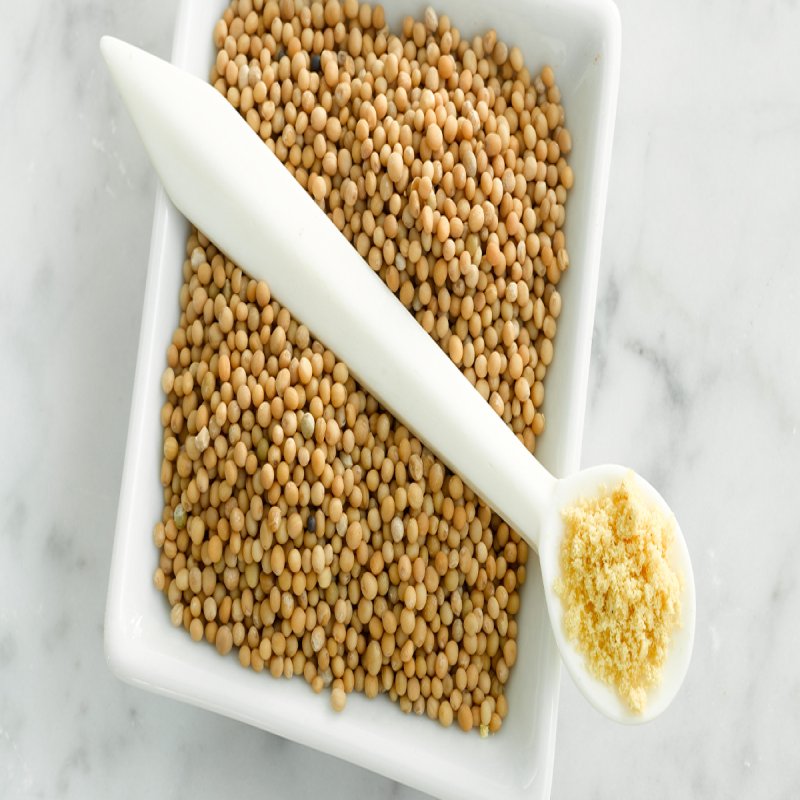
Mustard is an irreplaceable ingredient in most Indian kitchens, thanks to its characteristic flavor and aroma. We use both mustard seeds and mustard seed oil for cooking. Sarson ka saag, the popular Punjabi dish, is made from mustard greens, which is a favorite among many. Not only that, but consuming mustard has a variety of health benefits associated with it.
Read on to know about the incredible health benefits of mustard!

The various edible parts of the mustard plant have an entire gamut of helpful constituents in them. The seeds are a rich source of minerals such as calcium, magnesium, phosphorus, and potassium. Additionally, it is a good source of folate and vitamin A. Mustard greens, or the leaves of mustard plants, are an excellent source of essential minerals as well as dietary fiber. It also contains vitamin A, vitamin K, and vitamin C.
Did You Know?
– Mustard has been mentioned around 5 times in the Bible, once as the greatest herb ever.
– Hippocrates used mustard seeds for medicinal purposes.
– The Romans added mustard seeds to their wine.
– Pythagoras, the Greek scientist, used it as a natural treatment for scorpion stings.
Mustard slows down the fermentation process while making apple ciders and prevents the spoilage of meat products since ancient times. It is used globally as a flavoring agent and culinary preservative. Dried yellow mustard gives a nice flavor when added as a seasoning in salad dishes, mayonnaise, and dips.
Yellow mustard flour has emulsifying and stabilizing properties, which are great for preparing sausages. Yellow mustard is an integral component of condiment preparations such as table mustard. Whole mustard seeds add a nice flavor to pickles and dips. It serves wonderfully as a cooking oil for deep-frying or preparing stir-fry vegetables as it has a high smoke point.
Health Benefits of Mustard
Different parts of the mustard plant have been proven beneficial in treating cancer, diabetes, and preventing toxin accumulation in the body. It can also provide relief from muscular pains, psoriasis, ringworm, contact dermatitis, and respiratory disorders. Mustard also possesses poison-repelling qualities, exerts therapeutic effects on the nerves, and helps maintain cardiac health. Additionally, it promotes healthy skin and hair, lowers cholesterol, and benefits women during menopause.
Let’s have a deeper look into the health benefits of mustard.
Prevents Cancer
The seeds of a mustard plant contain generous amounts of healthy phytonutrients called glucosinolates, which can prove valuable against various cancers such as bladder, colon, and cervical cancer. The cancer-preventive properties of its seeds help destroy malignant cells without affecting normal, healthy cells.

Detoxifies Body
Mustard greens may help support the detox system of the body due to the presence of antioxidants and fiber. Glucosinolates present in them help regulate the action of detoxification enzymes, which help eliminate harmful toxins from the body. Mustard seeds possess protective emetic qualities, which reduce the effects of poison on the body. A concoction made with mustard seeds helps in cleansing the body, especially if poisoning occurs from narcotics or an excess intake of alcohol.

Maintains Bone Health
Mustard greens may prove valuable for women during menopause. Magnesium, along with the calcium present in it, promotes bone health and prevents bone breakdown associated with menopause. It helps in recompensing low magnesium content in bones and may help reduce the risk of osteoporosis in menopausal women.

Know how calcium improves bone health here!
Relieves Pain
Poultice, or plaster made from mustard seeds, helps in curing pains and spasms. Mustard is a rubefacient (causes dilation of the capillaries and an increase in blood circulation); hence, when you apply it as a plaster, it exercises analgesic effects and provides relief from limb paralysis, rheumatism, and other muscle aches.

Cures Ringworms
The anti-bacterial properties of mustard seeds are effective in curing the lesions that occur due to ringworms. Topical application of a mustard seed paste on clean skin washed with warm water helps soothe the symptoms associated with ringworms.

How do you Include Mustard in your Diet?
Mustard seeds are largely used for tempering, a method widely used in Indian cuisine. The process involves adding a mixture of whole or ground spices to a dish after sautéing it in hot oil or ghee. You can also use it for pickling, in chutneys, and in non-vegetarian dishes to enhance the taste of meats and fish. You can add the famous Dijon mustard and others of its kind to sandwiches, hamburgers, corn dogs, and hot dogs. Additionally, you can use it as an ingredient in many dressings, glazes, sauces, soups, and marinades.

You can use brown mustard seeds for garnishing after sautéing it in a little oil. However, overcooking mustard seeds may turn them bitter. Mustard seed paste is also used to make famous Bengali dishes like “sorshe ilish” and “chingri sorshe.”.
Disclaimer –Uncooked mustard seeds and leaves contain goitrogens, which may mess up the functioning of the thyroid gland. People already suffering from thyroid disease should always cook the mustard prior to consumption to neutralize its effect. Mustard also contains oxalate, which interferes with the absorption of calcium. Individuals already suffering from oxalate-related disorders, such as kidney stones, should not overconsume mustard.
Nutritional Information-
100g of mustard seeds provide 508 Calories, Carbs – 28g (Dietary Fiber – 12g, Sugar – 6.8g), Protein – 26g, Fat – 36g, Sodium – 13mg
And a percentage daily value of Vitamin A – 1%, Vitamin C – 12%, Iron – 51%, Calcium – 27% (based on a 2000-calorie diet).


.png)


